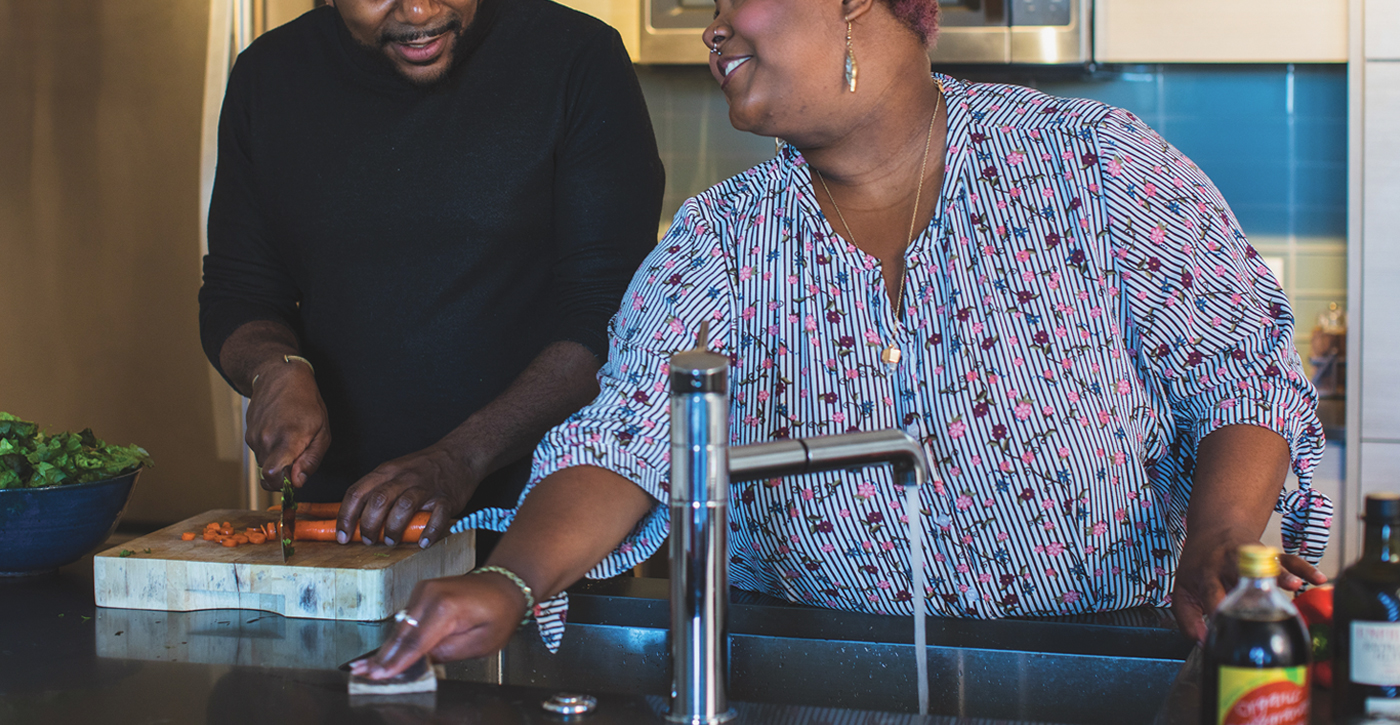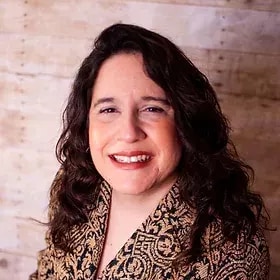Quaker meetings often use communal meals such as potlucks to strengthen ties among Friends, as did the early Christians with their love feasts, according to Steve Angell, professor of Quaker studies at Earlham School of Religion in Richmond, Indiana. Though intended to reinforce social and spiritual bonds, common meals have a different meaning for Friends with eating disorders, many of whom do not publicly discuss their conditions. Friends Journal talked with several Quakers about how meetings can respond to the concerns of those who live with eating disorders or have loved ones with such experiences.
A Friend who requested anonymity due to the sensitivity of the subject said she has had an eating disorder since adolescence and is now in her 40s. Attending meeting potlucks is difficult because she cannot eat safely. She got married under the care of a Quaker meeting at the same time she had finished her graduate studies: a stressful period of her life. As she had feared, the wedding cake triggered disordered eating.
The person does not share information about her eating disorder with Friends from meeting because she does not consider Quakers well-equipped to deal with such issues. Instead, she discusses the concern with members of her Overeaters Anonymous (OA) group. Overeaters Anonymous is a 12-step program that helps participants recover from a range of unhealthy food habits. For the Friend, the sixth and seventh steps of the program involve inviting God in to transform one’s life, having realized that everyone is broken and loved by God.
Having survived trauma, she believes in part that overeating is essential to survival and that it makes her safe. However, when she encounters Divine Grace, she is told that that belief is not true. She commits to writing and mindfully meditating every day. The Friend finds the spirituality of OA and her Quaker faith complementary. The Quaker testimony of integrity has particularly helped her.
“I think the focus on integrity helps me to stop lying to myself about what’s happening,” she said.

Another Friend experienced some problems with his attempt at weight loss, and he emotionally supported his late brother, who had anorexia.
Doctors diagnosed Carl Blumenthal’s brother with anorexia in the 1970s, but no treatment was yet available, said Blumenthal, who is a member of Brooklyn (N.Y.) Meeting. Blumenthal’s brother, Hank, was a scholar and athlete who excelled at basketball and felt a lot of pressure to stay lean. Hank spent more than a year in the hospital. When the men’s mother died in 2015, Hank experienced depression, which co-occurred with anorexia. He was five feet, eight inches tall, and he initially weighed 210 pounds. Hank died of anorexia and other health problems in May 2022 after, Blumenthal estimates, Hank’s weight plummeted to 85 pounds. Blumenthal spent six months commuting from Brooklyn, New York, to visit his brother in the hospital in New Haven, Connecticut. The distance between the two cities is about two hours each way.
“In my brother’s case, it was a form of control,” said Blumenthal.
Blumenthal’s own unhealthy eating patterns sometimes co-occurred with the bipolar disorder that led him to attempt suicide six times, he said. Depression suppressed Blumenthal’s appetite. He also ate little in order to lose the weight he had gained as a side effect of taking Depakote to treat the bipolar disorder.
When Blumenthal experienced severe depression, members of the Care and Counsel Committee offered to worship with him at home, but he refused because he felt a strong need to isolate and rely primarily on emotional support from his wife.
Re-engaging with the meeting has helped to improve Blumenthal’s mental health and relationship with food. He currently serves on his meeting’s Community Dinner Committee, through which Friends cook and share meals with people experiencing homelessness.
“Cooking became both therapeutic and ministerial for me,” Blumenthal said.
He also works as a peer counselor at NYC Well, a hotline that helps people with mental health concerns, and is a peer counselor at a Brooklyn hospital.
Communities can offer much-needed affirmation and acceptance to people with eating disorders. . . . People with such conditions especially need to hear, “We really love you. We care about you.”
Another Quaker discussed her nearly lifelong experience with disordered eating.
Billie Wade, 73, has had an eating disorder since age ten. Wade’s mother cooked “sweet, rich, large meals,” and insisted that her daughter eat everything on her plate, said Wade, a member of Des Moines Valley Meeting in Iowa. As a result, Wade learned to override her sense of feeling full. At the same time, her mother urged Wade to regain her previous smaller size, which motivated Wade to restrict her eating. At 13 years old, Wade weighed 146 pounds.
In more recent years, she has felt ashamed of her size due to critical comments from a medical professional as well as from dating partners. She has sometimes lost a significant amount of weight but has not felt supported in keeping it off.
Wade’s father had alcoholism and frequently expressed rage. In addition, Wade grew up in a Missionary Baptist church at which she learned to see God as angry and jealous.
“I grew up believing that not only did God not love me but that God was actively working against me,” Wade said. She overate to cope with her anxiety about human and divine wrath.
“My eating disorder came out of a damaged spirituality and a damaged emotionality,” she explained. Wade currently overeats chips and cookies at night.
Wade, who is bisexual and currently identifies as lesbian, belongs to a lesbian organization that uses the meetinghouse for game nights and movie gatherings. One person in the group is a Quaker and suggested that Wade visit the meeting. Wade was impressed by how calm and peaceful the Quaker group member was.
When she visited the meeting for the first time, she encountered the Divine in the silence.
“I had always wanted to feel the Holy Spirit,” Wade said.
During the meeting for worship, she experienced a tingling from the top of her head to the soles of her feet, which she interpreted as divine. She now experiences the Spirit in prayer, in worship, while writing, and during daily walks. She became a member of the meeting in April 2022.
Wade uses a walker and copes with anxiety and depression. She has a care committee composed of Friends from meeting. She could tell the committee that she needs support with her eating and weight concerns, but it had not previously occurred to her to do so. Friends do not say anything to Wade about weight.
“I was openly embraced from the very beginning,” she said of her experience attending meeting since 2020.
She notices that she is the only overweight person as well as the only Black person at meeting. On January 29, she was scheduled to offer a second-hour talk on her experience as the only Black person in the meeting. At the time of the interview, she was considering offering another second-hour presentation on weight and asking Friends for support.
At meeting, Wade lives contradictory emotional experiences simultaneously: “I feel conspicuous and invisible,” Wade said.

Friends who have eating disorders need a combination of meeting support and professional medical care. Care and Counsel committee members can offer spiritual and social connection to complement therapy for Quakers with eating disorders.
Care and Counsel (or Care and Concern) committees can develop their skills and knowledge by asking for resources from their yearly meetings, Earlham School of Religion, and medical professionals, according to Jim Higginbotham, professor of pastoral care and associate dean at Earlham School of Religion. Higginbotham spoke from his general expertise in pastoral care rather than from any experience helping Friends with eating disorders. To help a Friend with any chronic illness, a Care and Counsel committee can form a small support team to provide such practical assistance as transportation to medical appointments as well as spiritual solace, according to Higginbotham. Friends who have ongoing health problems might cope with loss of identity as well as derailed hopes and dreams.
Care and Counsel members from programmed meetings could use their typical worship structures to embrace a Friend with a chronic condition. Those from unprogrammed meetings could consider using more ritualized worship to offer support.
“How might the Spirit lead them to create rituals that make it very clear that the community is with the person going through a difficult time?” Higginbotham asked.
Care and Counsel committee members I spoke with emphasized that they would seek to convey acceptance and support if a Friend with disordered eating approached them for help but would also recognize that the person required expert medical and psychological treatment.
“Anyone with an eating disorder, you would want to keep them within the embrace of the community and not have them feel ostracized,” said John Calder, clerk of Ministry and Counsel of New Brunswick Meeting in Woodstock, New Brunswick. Calder also noted that committee members would encourage Friends with disordered eating to seek medical help.
Care and Counsel members could give rides to therapy appointments, offer a clearness committee, and refer the person to professional treatment resources, according to Randee Humphrey, who previously served for six non-consecutive years as co-clerk of Care and Counsel at Richmond (Va.) Meeting. Humphrey emphasized that the committee keeps all its assistance confidential and allows Friends to decide if they want help.
“There is that fine line between wanting to be a support but trusting the individual to know how to reach out for support,” Humphrey said.
Care and Counsel members should respond to Friends with eating disorders in a nurturing, non-judgemental, and non-moralistic way, according to Leigh Smit of the Care and Counsel Committee at Montreal Meeting in Quebec. Smit also studies social service at Dawson College. Attaching moral significance to what one eats and viewing one’s eating habits as greedy or wasteful can trigger disordered eating and escalate guilt, according to Smit.
Care and Counsel Committee members emphasized that they would seek to convey acceptance and support if a Friend with disordered eating approached them for help but would also recognize that the person required expert medical and psychological treatment.
Research suggests that the most effective form of counseling to treat eating disorders is using cognitive behavioral therapy (CBT), according to Beth Mechlin, professor of psychology at Earlham College. CBT involves changing automatic negative thoughts that might contribute to emotional difficulties, including those related to disordered eating. A CBT-trained therapist would ask a client to reflect on times they engage in unhealthy eating to determine what triggers the behavior.
Care and Counsel members should avoid underestimating the danger of eating disorders and should be prepared to refer someone who has one to a physician and a therapist, according to Alaka Lindsley, a member of the Care and Concerns Committee at Olympia (Wash.) Meeting. Lindsley works as a licensed mental health counselor but has not worked with clients whose primary mental health concern is disordered eating. She noted that eating disorders are dangerous and debilitating, so they often require hospitalization.
“An eating disorder is a life-threatening disorder,” Lindsley said.
Friends with eating disorders suggested that Care and Counsel committee members avoid directly mentioning eating disorders to members and attenders they think might have them. When asked for advice for Care and Counsel committees on supporting people with eating disorders, Wade advised caution. Commenting on someone’s eating habits or weight could profoundly insult the person even if the speaker believes they are expressing care. To the listener, such observations could sound like, “Somebody is telling me I’m too fat to be in the meeting,” Wade said.
Instead of singling out individuals, the Care and Counsel committee could overtly communicate that they are open to providing spiritual and social support to Friends facing a variety of problems, including mental health concerns, according to Wade.
Having an eating disorder entails a lot of shame and secrecy, so Friends likely will not know that members and attenders have such conditions, the anonymous source said.
When asked for advice for Care and Counsel committees seeking to help Friends with eating disorders, the anonymous source pointed out the need for professional counseling and the importance of lay people recognizing the limit of their expertise in order to avoid doing unintended harm. That said, meeting communities can offer much-needed affirmation and acceptance to people with eating disorders, according to the source. People with such conditions especially need to hear, “We really love you. We care about you,” she said.







Often in a dysfunctional family, there is a lot of effort put into *fixing* the person who is identified as *the problem.* Amongst Friends this article emphasizes *nurture and loving care* for the person identified as having *the problem.*
It is important for my health and well-being that I eat mindfully with attention to what I am eating and how much. It is important to my spiritual well-being that I interact mindfully and be fully present with those I am interacting with.
Have Friends considered LESS emphasis on the chaos, disorder and uncertainty of the Potluck as a primary source of nurturing community. Most meeting’s accomplish hospitality without including/featuring alcohol. How can we be hospitable without the (dreaded) potluck?